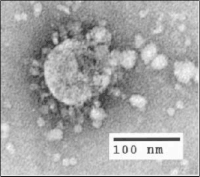
Photo from wikipedia
BACKGROUND Transplanting kidneys from donors with a recent history of severe SARS-CoV-2 pneumonia is uncommon due to concerns about the risk of viral transmission and the quality of kidneys from… Click to show full abstract
BACKGROUND Transplanting kidneys from donors with a recent history of severe SARS-CoV-2 pneumonia is uncommon due to concerns about the risk of viral transmission and the quality of kidneys from these donors. To date, there are no conclusive data on viral transmission from extrapulmonary solid organ transplants. Given the prevalence of SARS-CoV-2 infections in potential donors, shortage of kidneys available for transplantation, and low risk of viral transmission, we developed a clinical protocol for accepting kidneys from donors with recent severe SARS-CoV-2 pneumonia who demonstrate preserved kidney function. MATERIALS AND METHODS We collected data on early outcomes of 5 kidney transplant recipients from 4 deceased donors hospitalized for severe SARS-CoV-2 infection. RESULTS Donor creatinine ranged from 0.51 to 0.60 mg/dL and kidney donor profile index (KDPI) from 14 to 52%. Three of the five kidneys were from donation after circulatory death. All recipients were fully vaccinated, and 4/5 received post-exposure prophylactic monoclonal antibody treatment. While 3 recipients had delayed graft function, all had excellent graft function at 3 or 4 weeks post-operatively. None of the recipients displayed signs or symptoms of SARS-CoV-2 infection post-transplant. CONCLUSION Our findings suggest that kidney grafts from donors with a recent history of severe SARS-CoV-2 infection but with preserved kidney function can be safely used and have good early outcomes.
Journal Title: Clinical nephrology
Year Published: 2022
Link to full text (if available)
Share on Social Media: Sign Up to like & get
recommendations!